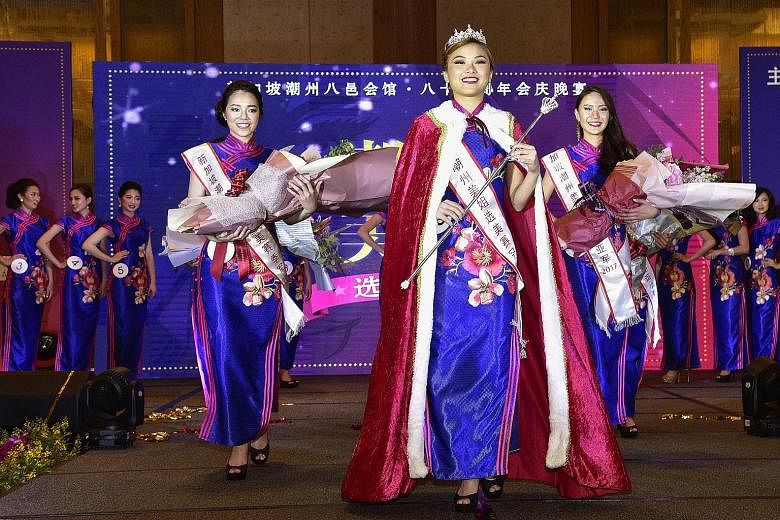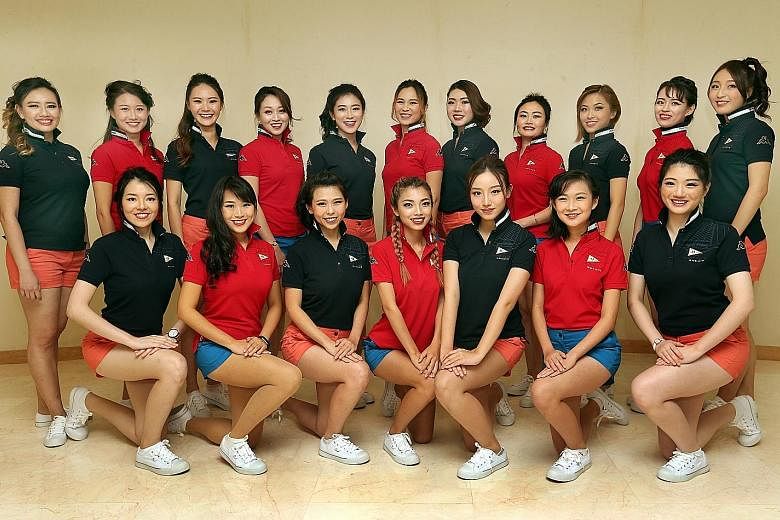Last month, a group of beauty pageant finalists met their instructors for rehearsals.
But instead of learning to model swimwear, the 19 young women were drilled in Teochew phrases such as "leu hoh, wuo mia si..." (hello, my name is...), and the history and cuisine of the dialect group.
Their coaches were former beauty queen Teo Ser Lee, 52, a Teochew herself, and - more unusually - dialect teacher and former broadcaster Lim Ngian Tiong, 65.
The training was part of the search for Singapore's first Miss Teochew, in what is believed to be the first dialect-based beauty pageant here.
It was organised by the Teochew Poit Ip Huay Kuan in conjunction with its 88th anniversary, and the finals were held on Saturday. The winner was Ms Angele Chan, 22, a Singapore Management University student, who received $2,000 in cash and $3,000 in vouchers.
The pageant was aimed at attracting younger people to the organisation, said its vice-president, Mr Chan Kian Kuan. "There is this image of us as a group of old men. In the last few years, we have tried to draw the youth in so that the Teochew culture can be passed down to future generations."
Pageants have a wide demographic appeal, he explained. He also hopes that the pageant will be a platform for young women to make friends within the association.
The crowned Miss Teochew had to embody the "traits" of a Teochew girl, he stressed.
"There is this enduring image of the gentle, demure, elegant and refined Teochew girl," he stated. "We wanted the pageant winner to be a positive reflection of these values that we consider to be part of Teochew culture."
-
WHAT IT TAKES TO BE A MISS TEOCHEW
-
Five criteria to become the next Miss Teochew, as laid out by pageant trainer Teo Ser Lee:
• BEAUTY: Physical appearance
• ELEGANCE: Able to wear a cheongsam with poise and flair
• ELOQUENCE: Able to make a short self-introduction in Teochew and answer questions fluently during a question-and-answer segment, with bonus points to those who can reply in Teochew, instead of in English or Mandarin
• PERSONALITY: Involvement in charitable organisations over the last two months, overall discipline, punctuality and attitude towards the competition
• STAGE PRESENCE: Confidence, poise and how she carries herself
Sue-Ann Tan
To participate, the women needed to have at least a Teochew father.
During the pageant, they had to introduce themselves in Teochew, which many struggled with. Their teacher, Mr Lim, said: "It was hard to teach them in just a few weeks because more than half of them had no prior contact with the dialect.
"Teochew has this flow and lilt to the words, so how they pronounced (them) was very important. I hope that young people learn at least a bit of their own dialect."
While organising a beauty pageant is an unusual outreach strategy by a dialect association, it is also one that some people may view as outmoded and playing on certain stereotypes.
It also underscores a challenge for dialect groups trying to attract the young in a society where dialect group distinctions are becoming increasingly diluted: For example, how is a Miss Teochew different from, say, a Miss Hakka?
Professor Lai Ah Keow, president of Hakka clan association Ying Fo Fui Kun, said that the identities of each dialect group are not very distinct in modern-day Singapore, unlike in China.
But, he added, young people should not forget the values that defined their forefathers. "The stereotype of Hakka people is that they are hard-working," he said.
"That value is always relevant."
Singapore Hokkien Huay Kuan's Cultural Committee vice-chairman Koh Chin Yee agreed that it is inevitable that the differences between dialect groups will become less distinct over time.
"People used to say the Teochews are proud and the Hokkiens are rough, but that was 50 years ago. Now, it's hard to tell one dialect group from another because our identity has become tied to nationality, not clan," Mr Koh said.
In the past, immigrants from the same clan stuck together, he noted. Each dialect group even held different occupations, such as the Hokkiens going into the sea trade and the Hainanese being cooks. Parents also sent their children to dialect-based schools.
"Now the general differences between the groups are diminished. But I feel the forms will still stay on, such as the Hokkiens having traditional Taoist rituals on the last day of the Chinese New Year," he added.
Mr Koh also felt that it remains important to preserve the values of each clan's forefathers. "Our Hokkien fathers had one important attribute, which is integrity."
Yet, even as the characteristics of each dialect group become less distinct and the Government makes it clear that Mandarin remains the official Chinese language, young Singaporeans are rediscovering their dialects - and roots.
Sociology professor at Singapore Management University Paulin Straughan said: "Younger Singaporeans now are curious about the language and cultures of their past, especially as the world becomes more globalised. They want to understand their roots and what defines them as individuals."
One of the pageant's contestants, Nanyang Technological University undergraduate Nowell Ng, 22, puts it thus: "No matter how Westernised we are, we need to know our own roots.
"I joined this pageant to learn to be an elegant Teochew girl and to wear that identity as a badge of honour."



